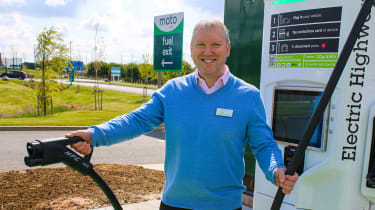

The UK’s biggest operator of motorway service stations wants to slash fuel prices by 10 to 12p per litre, but says National Highways red tape and bureaucracy over signage is blocking the attempt to save drivers cash.
Moto Hospitality runs nearly 70 service stations across the motorway network, and has been embroiled in a three-year bureaucratic wrangle with National Highways over the signage it says it needs to advertise proposed lower fuel prices.
Moto’s chief exec Ken McMeiken joined the company three years ago and immediately recognised that high fuel prices were deterring drivers from filling up at motorway services.
“It definitely came through in all the research when I joined, that people would like to see lower fuel prices,” he said. “I got the backing of Moto’s owners that we would look to reduce fuel prices, but only if we can get permission and actually get fuel signs onto the motorways.”
Speaking exclusively to Auto Express, McMeiken revealed: “More than two years ago I went to National Highways and the Department for Transport and said, look, I want to lower fuel prices on motorways, but to do that I’ve got to tell motorists what the actual price of fuel is. That needs a change in signage on motorways, so that drivers can make an informed decision about whether they’re prepared to turn in.”
According to Moto’s CEO, National Highways allowed Moto to erect a single electronic sign on the M5 motorway at Frankley North near Bristol. “But I had to trial it for a whole year for National Highways to say the sign was safe,” he said. “So we did that successfully and we managed to get the Secretary of State to agree to allow motorway operators to put digital fuel signs onto the motorway. We subsequently have managed to get a sign on our second site, which is on the M4 at Leigh Delamere, but it’s taking forever to get National Highways to allow us to put a third sign up at Lancaster on the M6.”
McMeiken says he’s frustrated by the bureaucracy and the slow pace of the National Highways response, following the 12-month trial. “It takes an incredibly long time to get approval, and we have to get it for each individual sign. It will probably have taken two years by the time I get Lancaster, which is a ridiculous length of time,” he said. “I originally thought it would take three to six months to trial, and then once we’d got permission that the signs could be used, I could start a full blown rollout across all of Moto sites.
“I’ve written to ministers as well as the chief executive of National Highways, but no matter what I try and do, I can’t get them to go any faster,” the exasperated CEO told us.
Signage needed to make lower motorway services fuel prices pay
We asked why Moto can’t simply reduce prices without the signage, but McMeiken says the company trialled that approach at two service stations when it launched its first signed trial at Frankley. “At a couple of our sites where we lowered the fuel price but we didn’t have a sign, there was some increase in volume, but it wasn’t enough to justify lowering the fuel price,” he said.

At signed sites, McMeiken says Moto’s aim is to compete with local high Street forecourt operators, so drivers don’t have to go off the motorway to get access to those lower prices. “That’s been anywhere between 10p and 12p depending on the time of year, which saves around seven pounds if you’re filling up,” he told us.
Need to sell your car?
Find your best offer from over 5,000+ dealers. It’s that easy.
The news that drivers could have been paying less for petrol and diesel on the motorways follows publication of the recent Competitions and Markets Authority investigation into high fuel prices. One of its recommendations was for greater transparency around fuel pricing, which the government claims to have accepted in full.
We’ve asked National Highways to comment on the charge from Moto that its slow and bureaucratic approach is preventing fuel price transparency on the motorways – and that its failure to move faster is costing drivers hard cash.
Would you like to see a cap on motorway fuel prices? Let us know in the comments…





